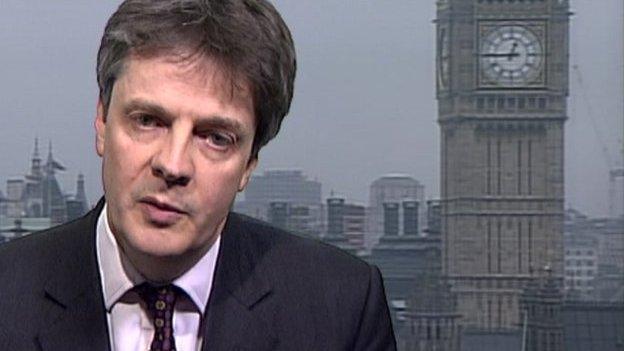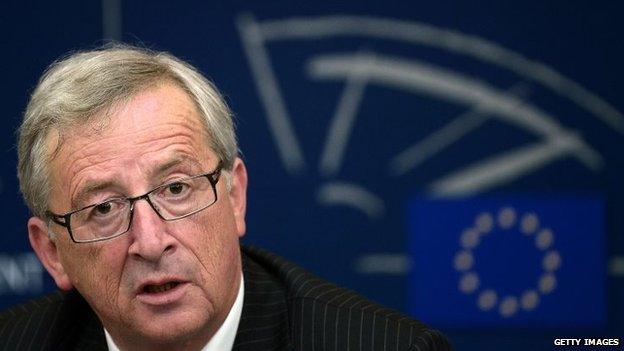Lord Hill set to become UK's new EU Commissioner
- Published

David Cameron has nominated Lord Hill, the ex-leader of the House of Lords, to be the UK's next European Commissioner.
Lord Hill of Oareford is a former education minister with a relatively low profile outside Westminster.
A number of former senior ministers were tipped for the role, including Andrew Lansley and Lord Howard.
New European Commission president Jean-Claude Juncker is to name his top team in the coming weeks, awarding different job portfolios to different countries.
Lord Hill is a former public relations executive who worked for John Major during the 1990s, including as political secretary during the negotiations on the Maastricht Treaty.
The nomination comes at a key time, with Mr Cameron seeking to renegotiate the UK's membership of the EU if he wins the next election and hold a referendum on the issue in 2017.
The peer's nomination will be presented by the prime minister to the European Council at a summit of the EU's 28 national leaders in Brussels on Wednesday.
If approved by the European Parliament, Lord Hill will serve a five-year term until 2019.
The appointment was seen as an important indication of the prime minister's strategy in Europe, with Eurosceptics in the Conservative Party urging him to pick someone who would take a tough line in negotiations.
In a press conference in Brussels, Mr Juncker said: "We have to take into account that the UK government will propose a list of competencies located in Brussels in order to repatriate them, to bring them back to the British Parliament, and other governments have ideas of the same kind.
"This will be a matter for negotiation. I will negotiate with David Cameron and with others and we will make a fair deal with Britain."

Analysis by James Landale
Lord Hill has kept his head down as leader of the House of Lords so it is just possible you might not have heard of him. But his appointment today is important.
Lord Hill claimed recently he didn't want the job, But today he said he was excited to play a part in reforming the EU. Jonathan Hill got the post because he is a highly effective operator and political insider. He ran John Major's policy unit at Downing Street, he set up and sold a successful PR business, before returning to government under the coalition.
He was also chosen because his departure will not prompt a risky by-election which the Conservatives might lose. Tory MPs said Lord Hill was eurosceptic enough to satisfy them but not so eurosceptic that he might be vetoed by the European Parliament.
The big question now is whether the new Commission president Jean Claude Juncker will consider him senior and experienced enough to win one of the big economic portfolios that Britain wants.

Lord Hill sought to resign from the government at the last major reshuffle in 2012 but was subsequently made leader of the House of Lords.
The Institute of Directors welcomed the nomination of Lord Hill of Oareford as the UK's next European Commissioner.
'Business friendly'
Director General Simon Walker said: "Lord Hill has a track record of rolling up his sleeves and getting on with the job at hand, and his proven ability to deploy these skills within the machinery of Whitehall will serve him well in Brussels.
"He is engaged with the business community and has a pragmatic approach to policymaking, both of which are crucial to the UK being able to secure a significant economic portfolio in the Commission. The task at hand is to deliver reforms which will benefit Britain, as well as make the whole of the EU more competitive, flexible and growth-orientated.

Jean Claude Juncker will have the final say over who gets the job of Commissioner
"It is now up to Lord Hill to set out clearly what his priorities will be in Brussels, to reassure the business community that he understands their concerns and that he is committed to making Europe more entrepreneurial and more business-friendly."
Katja Hall, deputy director general of the CBI, also welcomed Lord Hill's appointment and said he would be best-placed to "push for a more open, outward-looking and competitive EU" if Britain managed to secure a "key economic portfolio".
But she added: "Whatever the portfolio, we have the partners to turn reform into reality, so he must work hard cementing these alliances, making the UK's case in Brussels while also selling the benefits of the EU in the UK."
Names linked with the EU role in recent weeks included David Willetts, who quit the government on Monday, former Commons leader Andrew Lansley and former Conservative leader Lord Howard.
Mr Cameron's choice of Lord Hill as the UK's preferred candidate means that the government will avoid a by-election in the coming months.
Lord Hill will succeed Lady Ashton, who was nominated by Gordon Brown in 2009 and subsequently got the job of as EU high commissioner for foreign affairs.
'Scrutiny'
However, he will not necessarily hold the same role with Mr Juncker set to award different portfolios - including the all-important economic ones - in the coming weeks.
Campaign group Open Europe said Mr Cameron had "clearly let other considerations," such as avoiding a by-election, "trump sending the highest profile candidate to Brussels".
Director Mats Persson said: "The chances of the UK securing one of the key portfolios in the next European Commission - internal market, competition or trade - have worsened but have not been completely squashed."
The Labour Party is calling on David Cameron to allow MPs to scrutinise Lord Hill's appointment after the prime minster suggested he was prepared to consider such a move.
In a letter to the prime minister Labour's shadow Europe minister Gareth Thomas said: "I'm sure you will agree that given the importance of the role, it is vital that such scrutiny takes place and that your nominee is able to demonstrate they are committed to an ambitious EU reform agenda, are capable of working across parties, and are able to demonstrate an ability to prioritise British interests.
"It would be disappointing if your nominee were only to face scrutiny from the European Parliament, and not our own, before their nomination is confirmed."
- Published4 July 2014